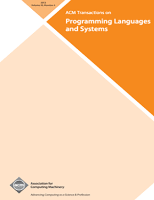
ACM TRANSACTIONS ON PROGRAMMING LANGUAGES AND SYSTEMS
Scope & Guideline
Shaping Tomorrow's Programming Paradigms Today
Introduction
Aims and Scopes
- Formal Methods and Verification:
The journal extensively covers topics related to formal verification of programming languages, including model checking, program synthesis, and proof systems to ensure the correctness and safety of software. - Programming Language Design and Implementation:
Research on new programming languages, type systems, and language features is a core focus, including innovative paradigms like choreographic programming and contract-client protocols. - Performance Optimization Techniques:
Papers often explore optimization strategies at various levels, including compiler optimizations, runtime performance improvements, and the development of efficient algorithms. - Concurrency and Parallelism:
A significant area of research involves the modeling and analysis of concurrent systems, with approaches for safe concurrent programming and performance considerations. - Type Systems and Semantics:
The journal emphasizes the development of advanced type systems and semantics for programming languages, addressing issues such as type safety, polymorphism, and session types.
Trending and Emerging
- Self-Stabilizing Compilers and Adaptability:
Emerging themes include the development of self-stabilizing compilers, which enhance robustness and adaptability in software systems, reflecting a trend towards resilience in programming tools. - Quantum Computing and Language Design:
As quantum computing gains traction, research on programming languages designed for quantum circuits and algorithms is becoming increasingly prominent, signaling a shift toward integrating quantum paradigms in mainstream programming. - Privacy and Security in Programming Languages:
There is a notable increase in research focused on privacy, security, and correctness in programming languages, particularly with the rise of decentralized applications and concerns over data privacy. - Program Synthesis and Automated Verification:
The journal is witnessing a surge in topics related to program synthesis and automated verification techniques, highlighting the importance of ensuring software correctness through automated methods. - Advanced Type Systems and Their Applications:
Research on advanced type systems, such as contextual types for privacy and session types for concurrency, is increasingly prevalent, reflecting a growing recognition of their importance in developing safe and reliable software.
Declining or Waning
- Traditional Object-Oriented Programming Approaches:
Research focused on conventional object-oriented programming paradigms has become less frequent, possibly due to the rise of functional programming and concurrent models that offer more robust solutions to modern programming challenges. - Static Analysis Techniques:
There is a noticeable reduction in the frequency of papers dedicated to traditional static analysis methods, as newer and more dynamic techniques and tools have emerged, offering more adaptable solutions. - Low-level Programming and Assembly Language Research:
Topics related to low-level programming languages and assembly have diminished, likely due to the growing abstraction levels in programming languages that prioritize developer productivity and safety.
Similar Journals
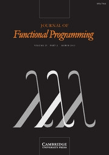
JOURNAL OF FUNCTIONAL PROGRAMMING
Inspiring the Next Generation of Functional Programming ScholarsJOURNAL OF FUNCTIONAL PROGRAMMING, published by Cambridge University Press, is a leading academic journal dedicated to advancing the field of functional programming. With an ISSN of 0956-7968 and an E-ISSN of 1469-7653, this UK-based journal has been disseminating high-quality research since its inception in 1991, and continues to thrive with a convergence set for 2024. Although the journal is categorized in the Q3 quartile in the Software category as of 2023 and holds a Scopus rank of #335 out of 407 (17th percentile), it remains a critical platform for innovative theoretical and experimental work in functional programming, attracting contributions from thought leaders and emerging scholars alike. The journal's objectives are to foster scholarly dialogue, provide insights into the latest methodologies, and explore the practical applications of functional programming concepts. While it does not currently offer open access, researchers and educators will find valuable resources that enhance understanding and inspire future developments within the discipline. Whether you are a seasoned professional, a researcher, or a student, the JOURNAL OF FUNCTIONAL PROGRAMMING promises to be an essential resource for your academic pursuits.

Frontiers of Computer Science
Fostering Dialogue that Shapes the Future of TechnologyFrontiers of Computer Science is a leading peer-reviewed journal dedicated to advancing the field of computer science through the publication of high-quality research articles, reviews, and theoretical discussions. Published by HIGHER EDUCATION PRESS, this journal has gained significant recognition, currently boasting a prestigious impact factor and ranking in the Q1 quartile for both Computer Science (miscellaneous) and Theoretical Computer Science categories in 2023. With a focus on the intersection of computational theory and practical applications, it serves as a vital platform for researchers, professionals, and students alike who are eager to contribute to and stay updated with groundbreaking developments. The journal’s scope encompasses a wide range of topics, reflecting the diverse nature of computer science today. Operating from Beijing, China, it emphasizes Open Access, ensuring that vital research is readily available to the global academic community. With its convergence period spanning from 2013 to 2024, Frontiers of Computer Science remains committed to fostering innovation and scholarly dialogue that drives the future of technology.
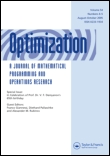
OPTIMIZATION
Unlocking potential through rigorous research in applied mathematics.OPTIMIZATION is a distinguished scholarly journal published by TAYLOR & FRANCIS LTD, catering to the vibrant fields of Applied Mathematics, Control and Optimization, and Management Science and Operations Research. With an ISSN of 0233-1934 and an E-ISSN of 1029-4945, this journal serves as a crucial platform for researchers, practitioners, and students alike, presenting cutting-edge research and innovative methodologies since its inception in 1985. With its current standing in the Q2 category across multiple fields as of 2023, OPTIMIZATION underscores its impact and relevance in the academic community, attracting high-quality contributions and fostering knowledge dissemination. Though it operates under a traditional access model, the journal ensures that its rigorous peer-reviewed content remains accessible to a wide audience, reflecting the latest advancements in optimization techniques and their applications in real-world scenarios. Whether you’re looking to deepen your understanding of optimization principles or apply these insights within your own research, OPTIMIZATION is an essential resource for advancing your knowledge and expertise in this dynamic field.

FORMAL METHODS IN SYSTEM DESIGN
Transforming theoretical insights into practical applications.FORMAL METHODS IN SYSTEM DESIGN, published by Springer, is a pivotal journal in the fields of Hardware and Architecture, Software, and Theoretical Computer Science. With an ISSN of 0925-9856 and an E-ISSN of 1572-8102, it has been at the forefront of advancing the understanding and implementation of formal methods since its inception in 1992, with a convergence slated through 2024. Given its ranking in the Q3 category across multiple computer science disciplines, it serves as a critical resource for researchers and practitioners looking to enhance the reliability and performance of complex systems. The journal offers an excellent platform for disseminating high-quality research that addresses the rigorous analytical techniques required for system design, making it invaluable for academics, professionals, and students alike. Notably, FORMAL METHODS IN SYSTEM DESIGN is based in the Netherlands, with its offices located at VAN GODEWIJCKSTRAAT 30, 3311 GZ DORDRECHT, NETHERLANDS, and although it does not currently offer open access, the journal's comprehensive archive remains accessible for deeper research into the formal methodologies that shape contemporary computing paradigms.
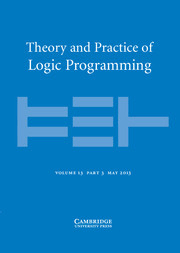
THEORY AND PRACTICE OF LOGIC PROGRAMMING
Exploring Innovations in Computational Theory.THEORY AND PRACTICE OF LOGIC PROGRAMMING, published by Cambridge University Press, is a premier academic journal that delves into the evolving field of logic programming, offering insights and advancements from 2001 to 2024. With an ISSN of 1471-0684 and an E-ISSN of 1475-3081, this journal serves as a vital resource for researchers, professionals, and students interested in areas such as artificial intelligence, computational theory, and software development. In 2023, the journal was recognized for its excellence, achieving Q1 status in Computational Theory and Mathematics and Q2 in several other categories, underscoring its significant impact within the academic community. Despite not being open access, its robust content, curated by esteemed scholars, guarantees high-quality research and innovative methodologies that are crucial for advancing the field. The journal's rigorous peer-review process and its standings in Scopus rankings further emphasize its relevance and authority, making it a quintessential platform for disseminating key findings and fostering scholarly dialogue.

Bulletin of the South Ural State University Series-Mathematical Modelling Programming & Computer Software
Exploring the Intersection of Theory and Application in MathematicsThe Bulletin of the South Ural State University Series-Mathematical Modelling Programming & Computer Software is a distinguished academic journal focusing on the interdisciplinary fields of mathematical modeling, programming, and software development. Published by the SOUTH URAL STATE UNIVERSITY, SCIENTIFIC RESEARCH DEPARTMENT, this journal serves as a platform for the dissemination of innovative research findings, methodologies, and applications in computational mathematics and related disciplines. With its ISSN 2071-0216 and E-ISSN 2308-0256, it has garnered attention within the research community, reflected in its rankings within the Q4 quartile across multiple categories in 2023, including Computational Mathematics and Software. Although it operates under an open access model, the journal emphasizes the importance of high-quality, peer-reviewed content to advance research education and practice in the Russian Federation and beyond. Researchers, professionals, and students are encouraged to contribute and access valuable insights, fostering collaboration among disciplines spanning mathematical theory, computational methods, and software development.
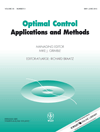
OPTIMAL CONTROL APPLICATIONS & METHODS
Exploring innovative methodologies for complex challenges.OPTIMAL CONTROL APPLICATIONS & METHODS, published by WILEY, is a prestigious academic journal dedicated to advancing the field of applied mathematics, control, and optimization. With an impressive impact factor in its respective categories—ranking in the second quartile for Applied Mathematics, Control and Optimization, and Control and Systems Engineering—the journal serves as a vital platform for disseminating innovative research findings and methodologies from 1980 to 2024. The journal is indexed in Scopus, with notable rankings in its discipline, highlighting its significance in the scientific community; specifically, it is ranked 143rd in Applied Mathematics and 35th in Control and Optimization, underscoring the quality and relevance of the research it publishes. Although not an open-access journal, it provides essential insights and methodologies of paramount importance to researchers, professionals, and students committed to the fields of control theory and systems engineering. It continues to foster knowledge and collaboration among experts to address complex challenges in automation and optimization.
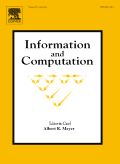
INFORMATION AND COMPUTATION
Transforming Ideas into Impactful SolutionsINFORMATION AND COMPUTATION is a peer-reviewed academic journal published by Academic Press Inc., Elsevier Science, dedicated to advancing the fields of computational theory and mathematics, computer science applications, and information systems. With an ISSN of 0890-5401 and an E-ISSN of 1090-2651, the journal provides a platform for innovative research that spans theoretical and applied perspectives. Acknowledged for its impact in the community, it holds a Q2 quartile ranking in several categories, including Computational Theory and Mathematics and Computer Science Applications, as of 2023. These rankings place it among the leading journals in its field, making it an essential resource for researchers, professionals, and students aiming to stay abreast of cutting-edge developments. While it does not currently offer Open Access options, the journal intends to foster scholarly communication and knowledge sharing from its inception in 1987 to its future issues expected through 2024. Located in the United States, at 525 B ST, STE 1900, SAN DIEGO, CA 92101-4495, INFORMATION AND COMPUTATION is committed to publishing high-quality research that influences the theoretical foundations and practical applications of its diverse disciplines.
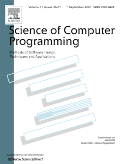
SCIENCE OF COMPUTER PROGRAMMING
Unveiling the Science Behind Software InnovationScience of Computer Programming, published by Elsevier, is a leading journal dedicated to advancing knowledge in the fields of computer programming, computational theory, and software development. With a focus on interdisciplinary research that spans computational methodologies, information systems, and simulation modeling, this journal plays a vital role in disseminating innovative findings and fostering collaboration among experts in these dynamic areas. With a respectable impact factor and ranked in various Scopus Categories such as computational theory (Q3) and information systems (Q2), it provides a platform for high-quality scholarly articles that push the boundaries of programming science. Although currently not open access, the journal offers invaluable insights for researchers, professionals, and students alike, ensuring they are equipped with the latest advancements and methodologies to thrive in an ever-evolving technological landscape. The journal covers research from its convergence starting in 1981 and continues to welcome groundbreaking contributions as it looks forward to an exciting future through 2025 and beyond.
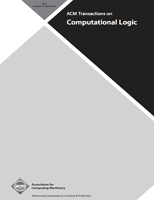
ACM Transactions on Computational Logic
Shaping the Future of Computational ThoughtACM Transactions on Computational Logic, published by the Association for Computing Machinery, is a premier journal dedicated to the advancement of computational logic, spanning the disciplines of computer science and mathematics. With its ISSN 1529-3785 and E-ISSN 1557-945X, this journal has established itself as a vital resource within the academic community, particularly noted for its influential contributions reflected in its 2023 scopus rankings. The journal holds notable quartile rankings, achieving Q1 in the fields of Computer Science (miscellaneous) and Logic, alongside Q2 in Computational Mathematics and Theoretical Computer Science, indicating its prestigious position in the respective categories. Researchers, practitioners, and students can access a wealth of rigorous research articles that delve into both theoretical frameworks and practical applications of computational logic, fostering innovation and collaboration in the field. As it converges towards its 2024 objectives, ACM Transactions on Computational Logic continues to uphold a commitment to excellence and impact, striving to shape the future of computational theories and methodologies.